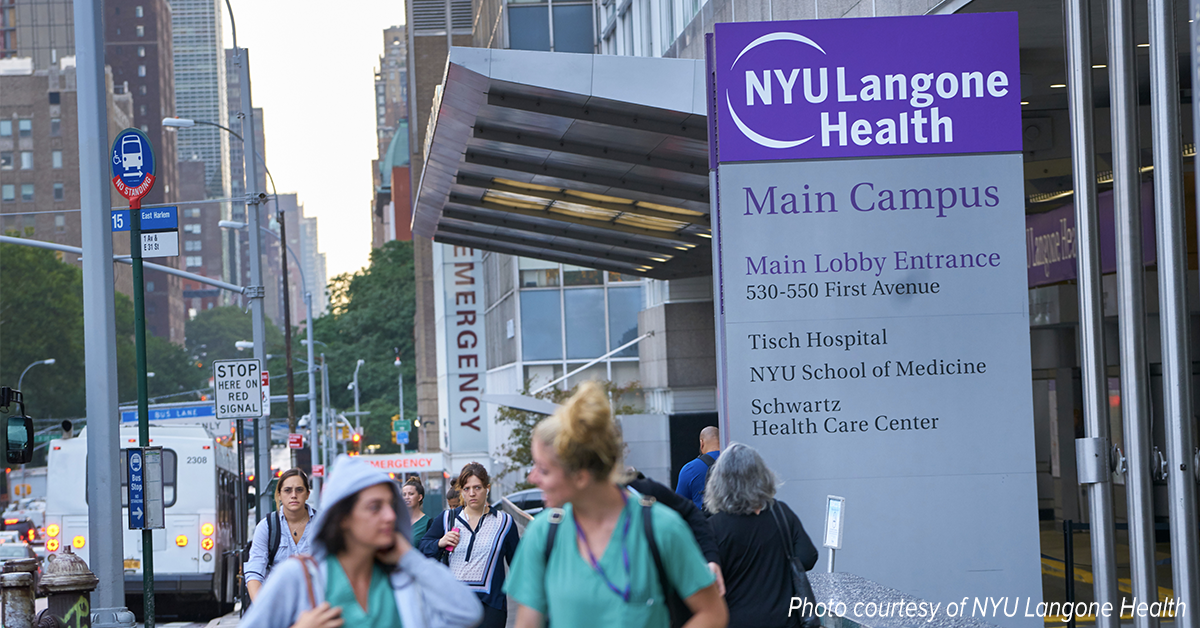NYU Langone Health protecting patients by investing in resilience
NYU Langone Health’s main campus is protecting its patients by investing in resilience.
NYU Langone Health – which was honored at CleanMed last month with the Climate and Health Innovation Award – is leading the way in climate resilience. The medical center continues to demonstrate this strength following a superstorm seven years ago.
Hurricane Sandy devastated New York City when it touched down in 2012 and destroyed an estimated 600,000 homes in New Jersey and New York. NYU Langone’s main hospital campus – part of 10 interconnected buildings located along the East River and in a FEMA high-risk flood area – was forced to evacuate as a result of the storm. The move meant ensuring the safety of hundreds of patients, many of them in critical care.
“Thanks to the heroic efforts of our staff and emergency responders, all of the patients were evacuated without injury,” Jenna Agins, the energy and sustainability manager for NYU Langone Health, said at CleanMed.
Agins explained that the hospital’s main campus was engulfed by more than 15 million gallons of water, which disrupted the health facility’s utility services. She added that destroyed facilities, equipment, and research resulted in $1.4 billion in damages.
“Yet, we embraced this disaster as an opportunity to change,” Agins said. “We embarked on a resiliency journey changing the very way we do business.”
After a thorough cleanup of the health facility, NYU Langone Health was able to resume full care services – with the exception of their emergency services – about two months after the storm, but has spent the past six years fully restoring and upgrading the facilities.
Agins said the medical center worked to develop robust emergency management and continuity planning after the storm. Just last year, NYU’s main campus became the first PEER Platinum level certified campus in the world. To help prevent the acceleration of climate change, they have also set an ambitious goal to slash their own emissions 50 percent by 2025 as part of the Mayor’s Carbon Challenge for Hospitals.
“NYU Langone Health has not only made their own facilities more resilient, but also have shared their lessons learned with the broader health care community nationally, and has been an active participant in municipal and state climate resilience work,” Jessica Wolff, Health Care Without Harm’ director of climate and health, said at CleanMed.
The medical center’s work on resilience following Hurricane Sandy was shared at Health Care Without Harm’s 2017 Resilience 2.0 Summit in Boston. NYU Langone’s work was also celebrated in the 2018 paper, “Safe haven in the storm: Protecting lives and saving margins with climate-smart health care” published by Health Care Without Harm and PricewaterhouseCoopers Advisory Services LLC.
NYU Langone Health is the second recipient of the Climate and Health Innovation Award. The award was established in 2018 with recognition of Rochester Regional Health for their renewable energy investments. Health facilities, like NYU Langone Health, are selected for demonstrating innovative work to reduce carbon emissions and striving to improve climate resilience.
During Hurricane Sandy NYU Langone Health experienced how large-scale natural disasters can compromise a community’s ability to access health and medical services, Agins said.
“Resiliency in the face of an uncertain climate future is paramount because, as a health care industry, we are a first line of defense,” Agins said. “Even if we are able to stop runaway climate change, changes are already here, and we must be prepared to fulfill our core mission of protecting human health and well-being.”
The medical center also updated infrastructure and looks to LEED and WELL certification when completing renovations and construction projects. NYU Langone has also achieved 31 percent of their 2025 carbon reduction goal since 2005.
The medical center also aims to reduce its water consumption by 35 percent in 2025. In the 2015 EnergyStar National Building Competition, one of NYU’s medical office buildings was awarded first place for water reduction efforts.
"We have taken this as an opportunity to not only push ourselves to meet the standard, but to set the standard,” Agins said to 1,000 CleanMed attendees. “And we want all of you to come along with us.”
Learn more about how health systems can invest in climate-smart health care in Safe haven in the storm: Protecting lives and margins with climate-smart health care.

